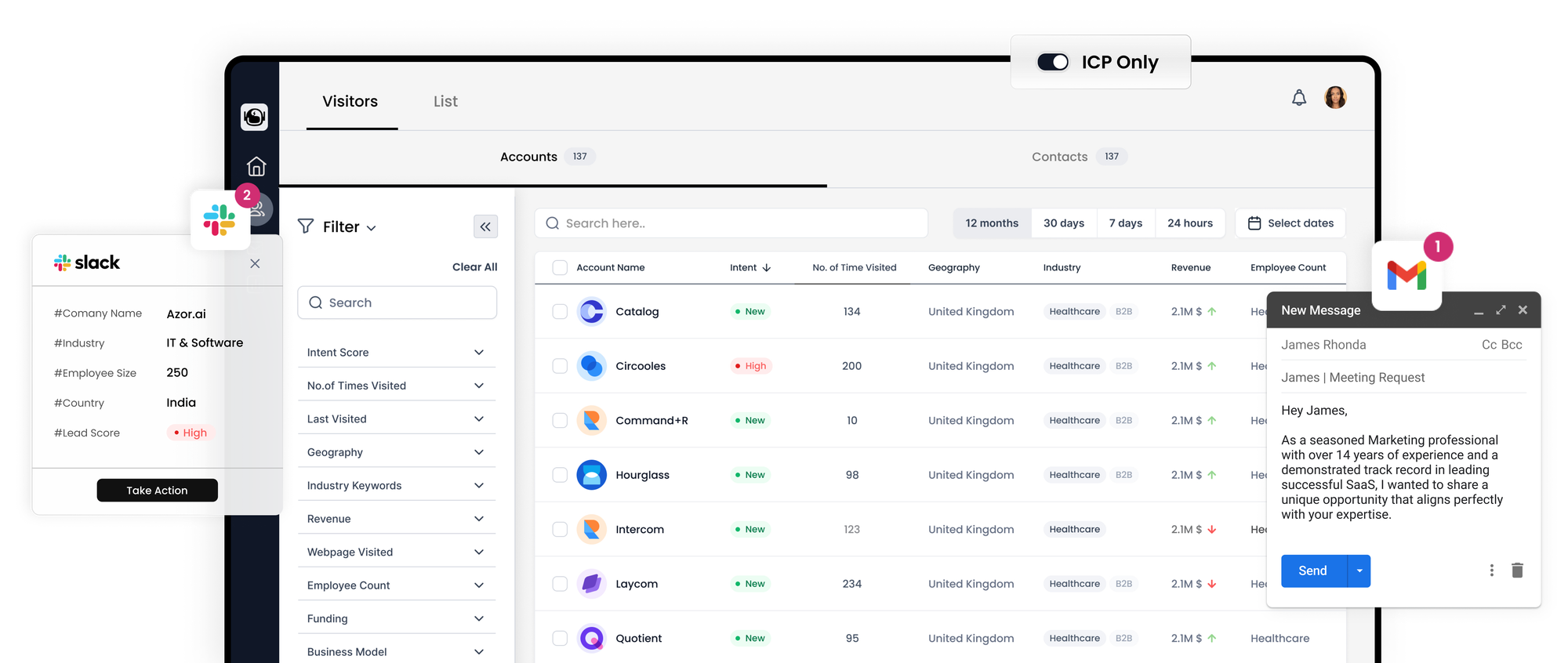Understanding B2B Lead Generation: Effective Strategies and Essential Tools for Exponential Growth in 2023

Introduction to B2B Lead Generation
B2B lead generation is a strategic process aimed at identifying and attracting potential customers who have a genuine interest in your business's products or services. This essential process relies on the implementation of well-crafted marketing and sales strategies that effectively pinpoint, engage, and nurture potential business prospects. The ultimate goal is to generate high-quality leads that can significantly boost your sales and contribute to the overall growth of your business.

Varieties of B2B Leads
In the realm of B2B lead generation, leads can be categorized into four distinct types, each distinguished by its level of engagement and readiness to progress through the sales funnel:
1. Information Qualified Leads (IQLs)
- Information Qualified Leads represent the initial stage of engagement. These leads provide basic contact information, such as names and email addresses, but have not yet displayed a significant interest in your products or services.
- They may have originated from form submissions or other online interactions with your brand. IQLs are essentially in the early stages of the sales cycle and require further nurturing and qualification to determine their potential as viable sales opportunities.
2. Marketing Qualified Leads (MQLs)
- Marketing Qualified Leads exhibit a higher degree of engagement and interest in your offerings compared to IQLs. These leads often take actions like downloading specific content, actively engaging with your marketing campaigns, or subscribing to your newsletters.
- MQLs typically meet specific criteria established by your marketing efforts but are still positioned in the early stages of the marketing funnel.
3. Product Qualified Leads (PQLs)
- Product Qualified Leads have previously interacted with your product or service. They might have signed up for a free trial or utilized a limited version of your platform.
- PQLs demonstrate a more substantial level of intent and qualification compared to MQLs. Their prior usage of your product signifies a higher likelihood of conversion and potential deal closure.
4. Sales Qualified Leads (SQLs)
- Sales Qualified Leads represent the most advanced stage in the lead qualification process. These leads have undergone rigorous vetting and are deemed ready for direct sales engagement.
- SQLs have met specific criteria, either established by your marketing or sales team, indicating a strong potential for converting into paying customers. They are primed for immediate sales outreach.
Incorporating effective lead generation strategies, coupled with the utilization of appropriate tools, can greatly enhance your ability to attract and convert leads across these different categories, ultimately contributing to your business's growth and success in 2023 and beyond.
The B2B Lead Generation Process: A Strategic Approach for Identifying and Nurturing Potential Leads
The B2B lead generation process is a structured method employed by businesses to effectively attract, identify, and foster potential leads within their target market. This systematic approach aims to secure a consistent stream of qualified leads that have the potential to be converted into paying customers. Here are the key steps that illustrate how the B2B lead generation process operates:
Step 1 – Defining Your Ideal Audience
The initial phase of the B2B lead generation process revolves around clearly delineating your business's target audience. This entails creating a comprehensive profile of your ideal customers and buyer personas. By identifying their characteristics, needs, pain points, and preferences, you can pinpoint the specific individuals or organizations that your business aims to attract.
Step 2 – Crafting Irresistible Offers and Lead Magnets
Subsequently, it is crucial to develop alluring offers related to your products and services that are designed to capture the attention of potential leads. Many businesses entice prospects by providing valuable incentives such as free memberships, trial access, e-books, and more, in exchange for their contact information.
Step 3 – Driving Traffic to Landing Pages
To effectively reach your target audience, leverage various B2B lead generation channels, including strategies such as cold email marketing and content marketing. These efforts should be directed toward directing traffic to dedicated landing pages where prospective leads can access the enticing lead magnets and offers.
Step 4 – Capturing Contact Information
Upon reaching your landing page, prospects should be motivated to engage with your offers and, in turn, complete an informational form. This form enables them to provide their contact details in exchange for access to the valuable resources you've offered.
Step 5 – Nurturing Leads
Once you've successfully collected the contact information of your prospects, it's imperative to establish and maintain an active relationship with these potential customers. Personalized communication across various marketing channels should be employed to keep them engaged and informed about your latest product and service offerings.
Step 6 – Lead Categorization
Recognizing that not all leads are at the same stage of readiness to make a purchase, it becomes essential to categorize them based on their level of interest and engagement. This categorization typically includes segments like IQL (Information Qualified Leads), MQL (Marketing Qualified Leads), PQL (Product Qualified Leads), and SQL (Sales Qualified Leads).
Step 7 – Closing Deals
With a pool of qualified leads at your disposal, your sales team should be proactive in engaging with these leads. They must address specific needs and concerns, providing tailored solutions through the sale of your products and services. This step is where the lead generation process culminates in the conversion of leads into valued customers.
The Importance of an Effective B2B Lead Generation Strategy for Your Business
There are numerous compelling reasons to embrace a robust B2B lead generation strategy for your business. An effective B2B lead generation strategy can:
1. Amplify Targeted Marketing Results
A well-executed B2B lead generation strategy magnifies the outcomes of your targeted marketing endeavors. This is because it ensures that your brand effectively reaches potential prospects who align with your ideal customer profile. It optimizes your marketing campaigns by precisely targeting the right audience.
2. Increase Sales Opportunities
B2B lead generation serves as a valuable tool for creating a pipeline of qualified leads for your sales team. The greater the number of potential customers engaged by your sales representatives, the higher the likelihood of closing deals and acquiring new customers. It paves the way for increased sales opportunities and revenue growth.
3. Enhance Business Stability
In a fiercely competitive business landscape, lead generation plays a pivotal role in enhancing business stability. B2B lead generation offers various advantages, including:
- Fostering enduring relationships with customers
- Establishing a consistent revenue stream
- Adapting to market fluctuations
- Reducing customer acquisition costs
- Elevating brand authority and reputation
Leveraging these benefits through effective lead generation techniques contributes significantly to the stability of businesses and ensures consistent organizational growth.
4. Provide Valuable Market Insights
Beyond identifying potential customers, B2B lead generation also delivers invaluable market insights through data collection and analysis. It compiles and evaluates data to discern the characteristics, preferences, and behaviors of your leads. This invaluable information enables a deeper understanding of your market, facilitating the refinement of your offerings for optimized business growth.
5. Facilitate Enhanced Business Growth
Quality lead generation is indispensable for the sustained growth of any business. Continuously attracting high-quality leads increases the likelihood of converting them into loyal customers. This, in turn, leads to heightened sales, increased revenue, and overall expansion of the business.
In summary, an effective B2B lead generation strategy empowers businesses to amplify their marketing impact, seize more sales opportunities, bolster stability in a competitive market, gain profound market insights, and ultimately achieve substantial and sustained business growth.
13 Proven Strategies for B2B Lead Generation
Generating high-quality B2B leads is a fundamental aspect of business growth. Below are 13 proven strategies to effectively acquire and nurture potential customers for your business:
1. Cold Emailing
Cold emailing remains a highly utilized B2B lead generation strategy. It involves sending tailored messages to decision-makers via email, capturing their attention, and enticing them to explore your products or services. Key considerations include crafting compelling subject lines, emphasizing value propositions, and including clear calls to action.
2. Content Marketing
Content marketing revolves around creating valuable and relevant content, such as articles, blog posts, and videos, to engage your target audience. This strategy establishes your business as an industry authority, enhances brand visibility, and fosters long-term customer relationships.
3. Social Media Marketing
Utilize social media platforms like LinkedIn, Twitter, Facebook, and Instagram to connect with your target audience. Consistently share valuable content, participate in industry discussions, and provide insights about your offerings to boost brand visibility and generate effective B2B leads.
4. Data-Driven Marketing
Harness the power of data analytics to gain insights into customer behavior, needs, and preferences. This allows you to create highly targeted campaigns, personalized marketing, and generate qualified leads for your business.
5. Pay-Per-Click (PPC) Advertising
PPC advertising involves paid ads on search engines or social media platforms. Conduct keyword research, create compelling ad copy, and pay only when viewers click on your ads. This strategy delivers instant visibility and precise targeting, driving traffic to landing pages and capturing high-conversion leads.
6. Referral Programs
Encourage existing customers to refer your business to their network by offering rewards or incentives. Positive recommendations from trustworthy sources enhance brand credibility and increase the likelihood of converting prospects into paying customers.
7. Account-Based Marketing (ABM)
ABM focuses on specific high-value accounts with the potential for conversion. Craft personalized campaigns that address key customer pain points and needs, building meaningful relationships, nurturing leads within key accounts, and increasing the chances of closing high-value deals.
8. Chatbots and AI-Powered Assistants
Implement AI-powered chatbots and assistants to provide real-time, automated, and personalized support to website visitors. They enhance the customer experience, engage leads, and gather valuable data.
9. Influencer Marketing
Partner with influencers in your industry to leverage their trust and credibility. Collaborate on sponsored content, product endorsements, and collaborations to expand your brand's reach and generate quality leads from their followers.
10. SEO Optimization
Optimize your website for search engines by conducting keyword research, creating high-quality content, and improving website visibility. Ensure user-friendly navigation and clear calls to action to convert visitors into customers.
11. Direct Outreach
Initiate direct communication with potential leads through email, phone calls, social media messaging, or in-person meetings. Personalized engagement addresses customer needs, strengthens brand-customer relationships, and boosts sales opportunities.
12. Video Marketing
Create engaging videos to showcase products, provide educational content, and tell compelling stories. Video marketing utilizes visuals and storytelling to leave a lasting impression, encouraging brand awareness and lead generation.
13. Multi-Channel Marketing
Implement a multi-channel marketing approach that combines various strategies, such as email marketing, content marketing, and social media. Utilize attribution models to track and optimize lead generation impact across different channels for maximum effectiveness.
By integrating these proven strategies into your B2B lead generation efforts, you can attract, engage, and nurture high-quality leads, ultimately driving business growth and success.
Frequently Asked Questions (FAQs)
1. What does B2B lead generation entail?
B2B lead generation involves the process of discovering and attracting new prospects for your business through various marketing campaigns. This process includes capturing customer information and providing them with valuable products and services through targeted marketing and other strategies.
2. What are the steps involved in B2B lead generation?
B2B lead generation is executed through a series of strategic steps within a brand's marketing campaign. These steps are designed to identify, engage, and nurture potential business customers.
3. How can B2B lead generation be enhanced?
There are numerous effective approaches to enhance B2B lead generation, including tactics such as cold email marketing, content marketing, social media marketing, paid advertising, and more. For additional B2B lead generation methods, please refer to the information provided in the blog above.
